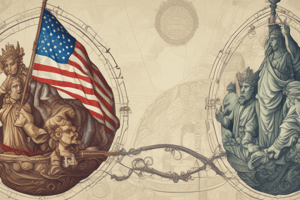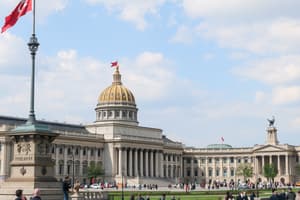Podcast
Questions and Answers
What is the primary goal of comparative politics?
What is the primary goal of comparative politics?
- To acquire knowledge about epistemological preferences
- To find out how politics works or operates (correct)
- To establish rules and standards of comparative analysis
- To study single countries
According to Landman (2008), what are the factors that influence the choice of comparative research methods?
According to Landman (2008), what are the factors that influence the choice of comparative research methods?
- Methodological traditions, epistemological preferences, and research design
- Research question, time, and resources
- Methodological comfort, research design, and data availability
- Research question, time, resources, methodological comfort, and epistemological preferences (correct)
What is the focus of the second tradition in comparative politics?
What is the focus of the second tradition in comparative politics?
- Descriptive information, causal explanations, and associations between key variables
- The study of single countries
- Epistemological preferences and research design
- Establishing rules and standards of comparative analysis (correct)
What is the role of epistemological preferences in choosing a comparative research method?
What is the role of epistemological preferences in choosing a comparative research method?
How many main traditions are there in comparative politics?
How many main traditions are there in comparative politics?
What is the focus of the first tradition in comparative politics?
What is the focus of the first tradition in comparative politics?
What is the primary focus of qualitative research?
What is the primary focus of qualitative research?
Which research method involves studying phenomena in their natural setting?
Which research method involves studying phenomena in their natural setting?
What is the characteristic of quantitative research?
What is the characteristic of quantitative research?
What is the goal of quantitative research?
What is the goal of quantitative research?
Which of the following is a characteristic of quantitative research?
Which of the following is a characteristic of quantitative research?
What is the primary difference between qualitative and quantitative research?
What is the primary difference between qualitative and quantitative research?
What is the result when rulers violate citizens' natural rights, according to Locke?
What is the result when rulers violate citizens' natural rights, according to Locke?
What is a key characteristic of the modern state, according to Locke's work?
What is a key characteristic of the modern state, according to Locke's work?
When did the modern idea of the state emerge in Europe?
When did the modern idea of the state emerge in Europe?
What is the main objective of studying politics in a comparative way?
What is the main objective of studying politics in a comparative way?
How many states existed in 1800?
How many states existed in 1800?
What is comparative politics concerned with?
What is comparative politics concerned with?
What marked the beginning of the real expansion of the state system?
What marked the beginning of the real expansion of the state system?
What is the task of a comparativist?
What is the task of a comparativist?
What happened to the number of international organizations and treaties after the Second World War?
What happened to the number of international organizations and treaties after the Second World War?
What is one of the critical questions in comparative politics?
What is one of the critical questions in comparative politics?
What do comparativists compare?
What do comparativists compare?
Why do comparativists compare political systems?
Why do comparativists compare political systems?
What is the scope and focus of comparative politics?
What is the scope and focus of comparative politics?
What do comparativists seek to understand?
What do comparativists seek to understand?
What is the approximate number of states according to the UN membership list, excluding the 4 European enclave states?
What is the approximate number of states according to the UN membership list, excluding the 4 European enclave states?
Which of the following territories is not recognized by the UN due to a lack of independence and/or legitimacy?
Which of the following territories is not recognized by the UN due to a lack of independence and/or legitimacy?
What is the primary criterion used by the World Bank to categorize countries into four economic categories?
What is the primary criterion used by the World Bank to categorize countries into four economic categories?
Which of the following statements is true about Taiwan?
Which of the following statements is true about Taiwan?
What is the status of Kosovo in terms of international recognition?
What is the status of Kosovo in terms of international recognition?
What is the term used to describe small states that are largely independent but lack full recognition?
What is the term used to describe small states that are largely independent but lack full recognition?
Which of the following European states is NOT considered an enclave state?
Which of the following European states is NOT considered an enclave state?
What is the main reason why Taiwan is not considered a full member of the international community?
What is the main reason why Taiwan is not considered a full member of the international community?
Flashcards are hidden until you start studying
Study Notes
Studying Politics
- Studying politics helps examine major questions in political science, such as why some countries have democratic regimes while others experience authoritarianism, why regimes change, and why some countries experience affluence and growth while others endure poverty and decline.
Comparative Politics
- Comparative politics entails the study of political, administrative institutions, processes, and behaviors across organizational, national, and cultural boundaries.
- It involves comparing institutions, processes, and behaviors of public management systems to build a theory of what works or to transfer best practices of public management to poor-performing areas.
Critical Questions in Comparative Politics
- Why are some political systems stable while others are volatile?
- Who makes political decisions, how did they acquire authority, and where does the authority come from?
- What decisions have been taken, why, and how do they affect the life of society?
What do we Compare?
- Comparative research methods are varied and depend on the research question, time and resources, methodological comfort, and epistemological preferences.
- Traditions in comparative politics include the study of single countries, methodological analysis, and the study of phenomena within their natural setting.
Traditions in Comparative Politics
- The first tradition is the study of single countries.
- The second tradition is methodological and concerned with establishing rules and standards of comparative analysis.
- The third tradition involves studying phenomena within their natural setting.
Research Methods
- Qualitative research is expressed in words, used to understand concepts, thoughts, or experiences, and provides in-depth insights into topics.
- Quantitative research is expressed in numbers and graphs, used to test or confirm theories and assumptions, and generates information through experiments and survey research.
Emergence of the Modern State
- The modern idea of the state emerged in Europe between the 16th and 18th centuries.
- The number of states grew slowly, with only 19 in existence in 1800 and barely 30 more by 1900.
- The real expansion of the state system began after World War II with decolonization and the growth of international organizations and treaties.
The Number of States
- The UN membership list excludes territories that function like states but lack independence and/or legitimacy, such as Kosovo, Palestine, Taiwan, and Western Sahara.
- Taiwan is structured and functions like a state but is not a UN member.
- Kosovo is recognized diplomatically by over 100 states but is not a political and diplomatic equal of UN member states.
- The number of states is debated, with some opting for the number 189, excluding four European enclave states.
Studying That Suits You
Use AI to generate personalized quizzes and flashcards to suit your learning preferences.




